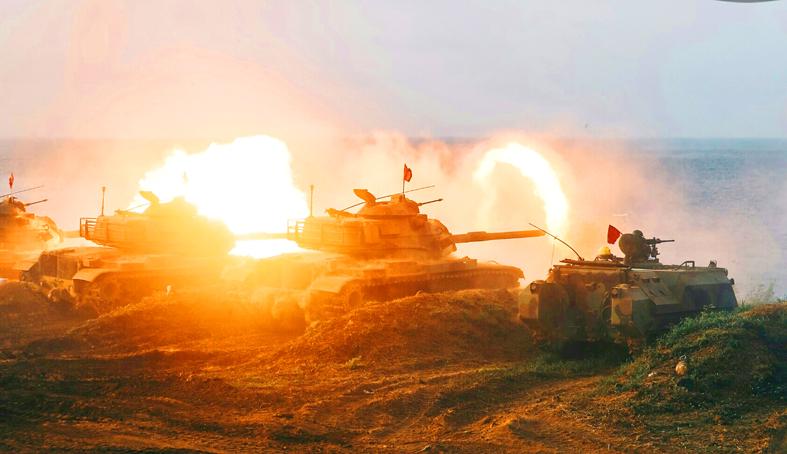A full Chinese invasion of Taiwan with troops landed and ports and airports seized would be very difficult to achieve due to problems China would have in landing and supplying troops, the Ministry of National Defense said in its latest threat assessment.
In a report to lawmakers, the ministry said as China’s transport capacity is limited, it would not be able to land all its forces in one go, and would have to rely on “non-standard” roll-on, roll-off ships that would need to use port facilities and transport aircraft that would need airports.
“However, the nation’s military strongly defends ports and airports, and they will not be easy to occupy in a short time. Landing operations will face extremely high risks,” the ministry said in its report, a copy of which was reviewed by Reuters.

Photo courtesy of the Military News Agency via CNA
China’s logistics face challenges, too, as any landing forces would need to be resupplied with weapons, food and medicine across the Taiwan Strait, it added.
“The nation’s military has the advantage of the Taiwan Strait being a natural moat and can use joint intercept operations, cutting off the communist military’s supplies, severely reducing the combat effectiveness and endurance of the landing forces,” the report said.
China would also need to keep some of its forces in reserve to prevent any foreign forces joining in to help Taiwan and to keep a close watch on other fractious areas of China’s border, such as with India and in the South China Sea, the report said.
“US and Japanese military bases are close to Taiwan, and any Chinese Communist attack would necessarily be closely monitored, plus it would need to reserve forces to prevent foreign military intervention,” it said. “It is difficult to concentrate all its efforts on fighting with Taiwan.”
Experts say that China has other means at its disposal to bring Taiwan to its knees short of a full invasion, including a blockade or targeted missile attacks.
President Tsai Ing-wen (蔡英文) is overseeing a military modernization program to make Taiwan harder to attack, making the military more mobile and providing it with precision weapons such as long-range missiles to take out an attacking force.
The government is planning to spend an extra NT$240 billion (US$8.63 billion) over the next five years mostly on weapons and new warships for the navy.

Taiwan has received more than US$70 million in royalties as of the end of last year from developing the F-16V jet as countries worldwide purchase or upgrade to this popular model, government and military officials said on Saturday. Taiwan funded the development of the F-16V jet and ended up the sole investor as other countries withdrew from the program. Now the F-16V is increasingly popular and countries must pay Taiwan a percentage in royalties when they purchase new F-16V aircraft or upgrade older F-16 models. The next five years are expected to be the peak for these royalties, with Taiwan potentially earning

STAY IN YOUR LANE: As the US and Israel attack Iran, the ministry has warned China not to overstep by including Taiwanese citizens in its evacuation orders The Ministry of Foreign Affairs (MOFA) yesterday rebuked a statement by China’s embassy in Israel that it would evacuate Taiwanese holders of Chinese travel documents from Israel amid the latter’s escalating conflict with Iran. Tensions have risen across the Middle East in the wake of US and Israeli airstrikes on Iran beginning Saturday. China subsequently issued an evacuation notice for its citizens. In a news release, the Chinese embassy in Israel said holders of “Taiwan compatriot permits (台胞證)” issued to Taiwanese nationals by Chinese authorities for travel to China — could register for evacuation to Egypt. In Taipei, the ministry yesterday said Taiwan

Taiwan is awaiting official notification from the US regarding the status of the Agreement on Reciprocal Trade (ART) after the US Supreme Court ruled US President Donald Trump's global tariffs unconstitutional. Speaking to reporters before a legislative hearing today, Premier Cho Jung-tai (卓榮泰) said that Taiwan's negotiation team remains focused on ensuring that the bilateral trade deal remains intact despite the legal challenge to Trump's tariff policy. "The US has pledged to notify its trade partners once the subsequent administrative and legal processes are finalized, and that certainly includes Taiwan," Cho said when asked about opposition parties’ doubts that the ART was

If China chose to invade Taiwan tomorrow, it would only have to sever three undersea fiber-optic cable clusters to cause a data blackout, Jason Hsu (許毓仁), a senior fellow at the Hudson Institute and former Chinese Nationalist Party (KMT) legislator, told a US security panel yesterday. In a Taiwan contingency, cable disruption would be one of the earliest preinvasion actions and the signal that escalation had begun, he said, adding that Taiwan’s current cable repair capabilities are insufficient. The US-China Economic and Security Review Commission (USCC) yesterday held a hearing on US-China Competition Under the Sea, with Hsu speaking on